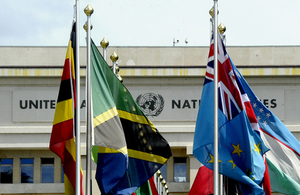UK statement at the UNCTAD Trade and Development Board
UK statement delivered on 5 December 2016.

The UNCTAD Trade and Development Board takes places at the Palais des Nations in Geneva
Let me begin by joining previous speakers who have congratulated you, President, on your election to the Trade and Development Board and in thanking the previous incumbent, Ambassador Suescum, for guiding us through a strenuous but productive period which included the 14th Ministerial Conference.
I should also say that the UK fully supports the statement made on behalf of the European Union and its Member States.
In Nairobi we said that the UK greatly values UNCTAD’s role as a place to meet and discuss trade and development issues, and that we wanted UNCTAD to work in the best interests of developing countries. We want UNCTAD to be an effective organisation that focusses on its core strengths of delivering high-quality analysis and research, sound policy advice and valuable technical assistance on the ground.
That is why we worked so hard at UNCTAD XIV to agree a mandate, in the shape of the Nairobi Maafikiano, which sets UNCTAD on the right track to deliver for those nations most in need of its expertise. The mandate that our Ministers agreed in Nairobi should also put UNCTAD in a good position as an implementing agency for the 2030 Agenda for Sustainable Development.
It is important that UNCTAD sticks to this mandate, since there is much valuable work that the organisation can do over the next four years. One of the areas where UNCTAD excels is in helping developing countries and Least Developed Countries in overcoming the digital divide and realising the potential of the digital economy to create growth and jobs for all.
The digital economy is an important driver for wider economic growth. Access to the internet is estimated to have the potential to generate over $2.2 trillion in additional GDP and more than 140 million new jobs in the developing world. This is why the UK supports UNCTAD playing a leading role in this field and we welcome the development of the ‘e-Trade for All’ project and look forward to seeing its implementation next year.
We commend the efforts made so far to implement robust results-based management procedures across the Secretariat’s work. The Nairobi Maafikiano, agreed by our Ministers, underlines the importance of results-based management as a tool to achieve greater efficiency and effectiveness in realising UNCTAD’s objectives. We encourage UNCTAD to continue its series of management briefings on this issue.
The UK is proud that we meet our commitment to spend 0.7% of Gross National Income on overseas development assistance. Our spending on aid for trade alone exceeds £1bn per year. At the heart of our approach is a desire for a more open global economy that creates jobs, promotes sustainable development, and improves living standards for all.
As our Prime Minister said in a recent speech, in an age where tensions have risen between those who are gaining and those who are losing from globalisation, we have to work harder to ensure that we shape a new era in which globalisation genuinely works for all. Together, we can shape a new approach to enhance the prosperity not just of some of our citizens, but of everyone.
For this reason, we want to see UNCTAD thrive, focussing on its strengths and providing a forum where members can make positive contributions, putting behind them the old debates that did not move the agenda forward, and joining together to turn the wise words of the Nairobi Maafikiano into action.